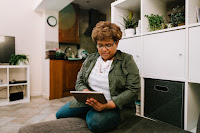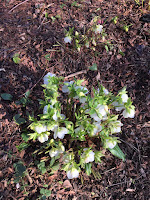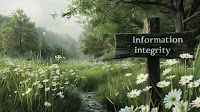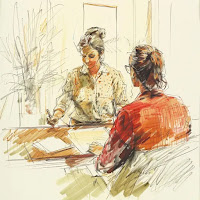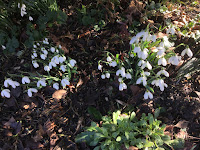There is a call for proposals for the 2024 Digital Pedagogy Institute (DPI) which takes place online on 13-15 August 2024. It is co-sponsored by the University of Toronto Scarborough Library, Brock University, Toronto Metropolitan University, and University of Waterloo, Canada. The deadline for proposals is 19 April 2024.
Streams include:
A. Critical Ideologies and Digital Pedagogy.
B. Digital (de)colonialism.
C. Inclusivity, Accessibility, and Digital Pedagogy.
D. Sustainability, Renewability, and Environmental Costs in the digital sphere.
E. Digital Pedagogy and the Post-Truth society.
F. Digital Pedagogy and Emerging Technologies.
Formats are presentations and tool demos/workshops
More details and proposal submission at
https://forms.gle/hZBjF7hrcj3FYRQB7
Photo by Sheila Webber: crocus, February 2024
Thursday, February 29, 2024
Call for proposals: Digital Pedagogy Institute
Tuesday, February 27, 2024
Age positive image library moves #nomorewrinklyhands
The Centre for Ageing Better's age positive image library has moved to https://www.agewithoutlimits.org/image-library This is a "free-to-use collection of over 3,000 photos of older people. The photos seek to show a positive and realistic depiction of later life, and to challenge negative stereotypes that we sadly too often see." I particularly like the age-friendly icons collection, and I urge people this resource to use it if they want a photo representing older people. Image published under CC0 1.0 Universal (CC0 1.0) via Centre for Ageing Better
Monday, February 26, 2024
MIL Hackathon winners
An article on the UNESCO website reports on the results of a Media and Information Literacy hackathon that took place in Indonesia in December 2023. It was part of a project Social Media 4 Peace and the hackathon was co-sponsored by UNESCO and the Nakara Foundation.
"49 people representing 5 media and 5 university teams from Bandung, Indramayu, Jakarta, Manado, Malang, Solo, and Sukabumi were selected to be the ten finalists competing in two categories of the hackathon – one for media and one for university students."
The media category was won by Tagih Janji (Bail the Promises) by ZonaUtara.com, North Sulawesi. Tagih Janji doesn't appear to be still available (there is a link in the UNESCO article but it is dead). However there is a display of screenshots from entrants I found at https://nakara.odoo.com/hackathon-display
The winner of the student category was a chrome extension, AI Hoax Buster, created by a team from the Islamic University of Raden Rahmat (UNIRA), Malang.
More details at https://www.unesco.org/en/articles/unesco-welcomes-winners-media-and-information-literacy-hackathon-indonesia-pathway-peaceful-polls
Photo by Sheila Webber: trees in the botanic gardens, February 2024
Sunday, February 25, 2024
Webinar: Asynchronous Learning and Scalar
The next free LiLi webinar is on 6 March 2024 at 10.00 US Pacific time: Asynchronous Learning and Scalar: A Beginner’s Experience with Creating Learning Modules led by Charmaine Henriques (International Studies Librarian at Herman B Wells Library, Indiana University, USA)
"The Covid-19 pandemic shined a light on digital education. Librarians used commonly known software and applications like Microsoft PowerPoint, Google Docs, and Canvas for online instruction. While it was logical to utilize these resources, there are other lesser-known user friendly options that could help librarians (especially those who are newer to asynchronous learning) with creating learning objects. One such possibility would be Scalar, a multimedia digital publishing platform. This presentation will give an overview of how a librarian with limited online education experience used Scalar to produce a leaning module for an upper-level undergraduate seminar."
The session will be recorded.
Register at https://northampton-edu.zoom.us/meeting/register/tJ0qc--oqD8pH9ZrPTOJtObSlO0S8tHyQgpz#/registration
Photo by Sheila Webber: Branches not yet spring, February 2024
Saturday, February 24, 2024
New report on Generative AI and Disinformation
"Researchers from several EU-funded projects on AI and disinformation that are carried out in dialogue with EDMO have joined forces and just published a new white paper. Its goal is to deepen understanding of the disinformation-generation capabilities of state-of-the-art AI, as well as the use of AI in the development of new disinformation detection technologies, along with the associated ethical and legal challenges. The authors conclude by revisiting the challenges and opportunities brought by generative AI in the context of disinformation production, spread, detection, and debunking."
Bontcheva, E. (ed.). (2024). Generative AI and Disinformation: Recent Advances, Challenges, and Opportunities.
https://edmo.eu/wp-content/uploads/2024/02/Generative-AI-and-Disinformation_-White-Paper-v8.pdf
Photo by Sheila Webber - I think these are hellebores, February 2024
Friday, February 23, 2024
Webinar: Tik Tok Infolit
RUSA has organised a free webinar on 28 February 2024 at 18.00 UK time (13.00 EST) Tik Tok Infolit. "Many are turning to TikTok, YouTube Shorts, and other short-form video platforms as their main sources of information. What implications does this shift have for information literacy instruction, content curation, research guides, and the other traditional ways that libraries mediate and promote access to information?
"Join us for an online conversation where we all can share ideas about how we can respond to this seismic shift in information seeking behavior, and perhaps if we should respond at all? Attendees will leave with actionable insights and a more proactive course for approaching the complexities of information literacy in the digital age."
Register at https://ala-events.zoom.us/meeting/register/tJYpdeyopjkiE92QPsf84UwKhjqB8TBNKQr5#/registration
Image by Sheila Webber using Midjourney AI, prompt iphone screen, tiktok video, fluffy cat, kawaii --ar 9:16 --v 6.0
Thursday, February 22, 2024
Webinar: Working together for Information Integrity
An IFLA event on 7 March 2024 at 14.00 UTC (the same as GMT/UK time) is Working together for Information Integrity: the Role of Libraries in Europe. Speakers are Divina Frau-Meigs @divinameigs (Media Sociologist, Sorbonne University, France); Paul Kilkenny (Assistant Principal, Digital Policy Analyst, Department of Tourism, Culture, Arts, Gaeltacht, Sport and Media, Ireland); Sherri Aldis, Director, UN Regional Information Centre, Brussels, Belgium) and Ertugrul Cimen (Chair, IFLA Europe Regional Division Committee, Turkey)
"We are at a time of growing awareness of both the opportunities that advances in knowledge bring, and the threats of inaccurate or harmful speech. In this context, the UN Secretary General, already in 2021, highlighted the importance of information integrity as a key determinant of success in wider policy efforts. This work is advancing rapidly towards publishing a UN Code of Conduct on Information Integrity in the coming months, which will address mis- and disinformation, hate speech, and protecting ourselves and our communities from harmful content.
"Libraries meanwhile have long focused on how to ensure that users have the possibility to access high-quality information, and the skills to appreciate and use it. This experience and expertise, as well as their reach across societies, makes them powerful potential partners in advancing this agenda."
It addresses the questions: What does information integrity mean? What are the key issues and questions behind the upcoming UN Code of Conduct on the topic? How are libraries impacted by mis- and disinformation? What can we learn from each other to counter this? How can libraries realise their potential to contribute, at all levels, to building a healthy information environment?
Register here: https://www.ifla.org/events/working-together-for-information-integrity-the-role-of-libraries-in-europe/
Image by Sheila Webber using Midjourney AI, promt serene landscape, green palette, hyper real, grass trees spring flowers, the words "information integrity" in bold font
Wednesday, February 21, 2024
Recent articles: Serendipity; Information quality; Libraries in computer games; Informal carers; Capital and information practice; Fake news
The latest complete issue of the priced Journal of Documentation (Volume 80 Issue 1, 2024) includes:
- Does serendipity matter in knowledge management? Organizational sharing and use of encountered information by Sanda Erdelez, Yuan-Ho Huang, Naresh Kumar Agarwal
- Parsing through paradigms: uncertainty and decision-making in human information behavior by Juliana Mestre
- Capital as the outcome of information practices: a study of devotees and monks of a Theravada Buddhist Temple by Hilary Yerbury, Michael Olsson, Pethigamage Perera
- Addressing the information needs of informal carers in Malawi: a healthcare intervention based on co-creation by Efpraxia D. Zamani, Laura Sbaffi, Khumbo Kalua
- Fake news as systematically distorted communication: an LIS intervention by John Buschman
-Exploring perceived online information quality: a mixed-method approach by Boryung Ju, J. Brenton Stewart
- A systematic review of information source preference research by Huan Zhong, Zhengbiao Han
- Depiction of library use in video games: a content analysis by Emerson Taylor, Chern Li Liew
Go to https://www.emerald.com/insight/publication/issn/0022-0418/vol/80/iss/1
Photo by Sheila Webber: Snow, February 2024
Tuesday, February 20, 2024
Y-skills publications
"The EC-funded research network ySKILLS aimed to identify the actors and factors that undermine or promote the wellbeing of children aged 12–17 in a digital age". There is a list of publications here: https://yskills.eu/publications/
The summary report outlining recommendations and principles concerning digital skills and literacy and children's rights is:
Livingstone, S., Stoilova, M., & Rahali, M. (2023). Realising children’s rights in the digital age: The role of digital skills. ySKILLS. https://zenodo.org/records/10201528
Monday, February 19, 2024
Webinar: Information Literacy and Artificial Intelligence
The CILIP Information Literacy Group has organised a webinar on Information Literacy and Artificial Intelligence (AI) on 20 March 2024 at 13.00-14.30 GMT (UK time). "This event is aimed at information literacy practitioners and library staff keen on acquiring knowledge and insight into the issues and implications of new AI technologies on IL." The cost is £3 to ILG members, £5 to thers. Speakers are:
Sarah Pavey (independent education consultant who worked as a school librarian for over 20 years): Generative AI in the School Environment.
Anne-Lise Harding (Strategic Training Lead at the House of Commons): Using AI in a parliamentary context.
Josh Rodda (Learning Development Librarian at the University of Nottingham): The relationship between AI and traditional ideas of authorship.
Rosie Jones (Director of Student and Library Services and interim
Director of Student Learning and Academic Registry at Teesside
University): (1) Exploring the boundaries for libraries, is this another
crossroads where we are deciding whether to lead or contribute, are we
even part of the conversation? (2) Does AI increase the digital divide?
The session will finish with a discussion moderated by Dr Jane Secker (Associate Professor in Educational Development at City, University of London).
More details and registration at https://www.eventbrite.co.uk/e/information-literacy-and-ai-roundtable-tickets-826960600417
Sunday, February 18, 2024
Survey on Open Educational Resources on Algorithmic Literacy
Library and information professionals are being asked to complete a survey partly funded by the US Institute of Museum and Library Services on Open Educational Resources on Algorithmic Literacy (grant number RE-254893-OLS-2).
"The survey will ask about your questions, interests, and experiences supporting algorithmic literacy. We define algorithmic literacy as awareness and understanding of the role algorithms and computation processing plays in information access and literacy, in your library.
The purpose of this research study is to explore how academic and public libraries understand and approach algorithmic literacy and possible community-driven strategies for building upon their current approaches. This study will also produce a report detailing these findings and open educational resources (OER) addressing the expressed needs and interests of participants." The survey is at https://cornell.ca1.qualtrics.com/jfe/form/SV_ba9BraCaTSFEp2C and there is an information sheet at
https://docs.google.com/document/d/1AHCAa_24TUCfFlb1HP5LiHvzh8eQDdUcqzzt425WKWQ/edit
Image by Sheila Webber using Midjourney AI using prompt woman administering questionnaire survey, office setting, line drawing, pastel wash
Friday, February 16, 2024
Keeping up with primary source literacy
Photo by Sheila Webber; camellia, Fubruary 2024
Thursday, February 15, 2024
Information & Democracy: Education, Access, Libraries, and Society
The Institute for Information Literacy at Purdue University, USA, has a virtual symposium, Information & Democracy: Education, Access, Libraries, and Society (ID:EALS) on 16 April 2024 at 9:00-16:00 USA EST (which is 14:00-21:00 UK time). The theme for this year’s symposium is Information & Identity.
"This event will showcase various scholarly approaches exploring how information is used to disempower and empower diverse communities. ID:EALS will feature researchers whose work investigates the role of information literacy in relation to different sociocultural identities, such as race, ethnicity, gender, and sexual orientation".
Speakers include: Dr. Megan Threats on InFormation for Health Justice: Utilizing Intersectionality Theory in (Health) Information Practices Research and Dr. Ellie Sayyad Abdi on Enhancing Refugees' Information Experiences.
More information & registration: https://www.lib.purdue.edu/IILP/Annual-Symposium
Photo by Sheila Webber: snowdrops, February 2024
Wednesday, February 14, 2024
Mixed Methods Systematic Reviews
Two series of priced online expert training sessions concerning mixed methods systematic reviews, which "combine qualitative and quantitative
evidence to answer complex applied health and public health questions." All times are GMT (UK time, and note that the UK doesn't leap forward to BST until 31 March, and the USA starts 3 weeks earlier, so there may be a different time difference from usual in those weeks if you are outside the UK)
1. Mixed Methods Systematic Reviews. Optional introduction. 8 March 2024 13.30-14.30 and Half-day live sessions on 12, 14, 18 & 20 March 2024 at 13.30-16.00.
Tutors: Dr Katy Sutcliffe, Dr Meena Khatwa, Dr Gillian Stokes, Dr Preethy D'Souza and Dr Michelle Richardson (UCL), Prof Joanne Greenhalgh and Judy Wright (University of Leeds), Prof Helen Elsey (University of York)
"The course is for you if you are interested in understanding how mixed-method synthesis provides a deeper understanding of complex interventions and their implementation. It is suitable for you if you already have an understanding of systematic review methods – i.e. you have had in-depth training and/or conducted a systematic review (either quantitative or qualitative) before. The course looks at purpose and value of mixed-methods systematic reviews and covers methods for synthesising qualitative and quantitative research including explanatory sequential, exploratory sequential, and convergent synthesis methods including an overview of realist synthesis methods. The mixed methods course is NOT suitable for you if you are new to systematic reviews as it does not provide basic systematic review (screening, data extraction, quality assessment) or meta-analysis training.
2. Searching the Evidence for Mixed Methods Reviews Optional introduction 21 March 2024 13.30-14.30 and
Half-day live sessions 25 & 27 March 2024 13.30-16.00
Tutors:
Judy Wright and Natalie King (University of Leeds)
"The course has basic and advanced elements, some sessions are split to cater for both researchers and experienced librarians. The course covers search techniques, sources, reporting methods and reference management that are most useful in mixed methods systematic reviews. This includes: search filters, forwards & backwards citation searching, CLUSTER searching, grey and published literature sources, reporting standards, tips for tracking search activities and managing large search results in EndNote.
See course website for fees and further details: https://medicinehealth.leeds.ac.uk/dir-record/short-courses/958/mixed-methods-systematic-review-and-searching-the-evidence
Photo by Sheila Webber of a bench in the snow, February 2024
Tuesday, February 13, 2024
Teaching Tips for Information Professionals
A priced online course Teaching Tips for Information Professionals lead by Andrew Walsh, on 23 April 2024 13:00-16:00 BST (UK time). Cost is £49.46. "An afternoon of basic teaching tips for archivists, librarians & other info workers, backed up by a short (PDF) book." More information, and registration, at https://www.eventbrite.co.uk/e/teaching-tips-for-information-professionals-tickets-831487831487
Photo by Sheila Webber: snowdrops, February 2024
Monday, February 12, 2024
Seniors United Against Misinformation
Seniors United Against Misinformation: A European Initiative for Media Literacy. An interesting project "We are a EU-funded project that unites three partners from diverse backgrounds and industries. We are united by a strong belief in the power of collaboration and knowledge sharing to tackle society's biggest challenges. We welcome the opportunity to share our experiences with any organization interested in joining us on this journey."
https://www.wearesum.eu/
Photo by Sheila Webber: snow, February 2024
Saturday, February 10, 2024
Algorithms of Resistance
A new open-access book:
Bonini, T. & Treré, E. (2024). Algorithms of Resistance: The Everyday Fight against Platform Power. The MIT Press. https://doi.org/10.7551/mitpress/14329.001.0001ISBN electronic:
9780262377485 " While accounts of platform power tend to come across as bleak and monolithic, Algorithms of Resistance shows how people can resist algorithms across a variety of domains. Drawing from rich ethnographic materials and perspectives from both the Global North and South, authors Tiziano Bonini and Emiliano Treré explore how people appropriate and reconfigure algorithms to pursue their objectives in three domains of everyday life: gig work, cultural industries, and politics. "
Image created by Sheila Webber using Midjourney AI using the prompt algorithms of resistence in the style of Paul Klee
Friday, February 09, 2024
New articles: Texts+podcasts; teaching to teach; virtual cohorts
The February 2024 issue of open access College & Research Libraries News is now available and includes:
- Terri Artemchik, Kirk Kirk, Eleanor Colbert, and Sarah Rebecca Velazquez Gaglio. Teaching to Teach: Developing a Collaborative Instruction Training Program for MLIS Interns.
- Ruth Monnier and Nena Schvaneveldt. Cohorts Building Community: Fostering Connection in Virtual Cohorts.
- Amy Barlow. Pairing Texts and Podcasts: Teaching Scholarship as Conversation in First-Year Seminar.
Go to https://crln.acrl.org/index.php/crlnews/issue/view/1652/showToc
Photo by Sheila Webber: Snow, February 2024
Thursday, February 08, 2024
Call for proposals: 22nd Annual Illinois Information Literacy Summit
The rere is a call for proposals for the 22nd Annual Illinois Information Literacy Summit to be held on 19 April 2024 at the College of DuPage in Glen Ellyn, Illinois. USA. It is organised by the College of DuPage Library and the DePaul University Library. Deadline for proposals is 15 February 2024.
(It says Feb 1st on the intial link on website but it has been extended)
Keynote speaker is Dr Troy Swanson (Library Department Chair at Moraine Valley Community College, USA). "We are seeking presenters to lead engaging and interactive discussions about media and information literacy, library instruction, and interdisciplinary collaboration. We are especially interested in breakout sessions and panels related to this year's theme: Tuning In: Navigating Capacity, Collaboration, & Cognition in Information Literacy. At this year's Summit, we're interested in exploring our "bandwidth" for information literacy and considering the topic from a wide range of perspectives."
They mention: Individuals' cognitive and emotional bandwidth for processing the vast amounts of information we encounter as students, researchers, and as citizens; Individual and organizational bandwidth in the workplace; Critical perspectives on tools and partnerships that seek to enhance our bandwidth.
More information at https://www.infolitsummit.org
Wednesday, February 07, 2024
Recent articles: Outcomes; Disinformation; Print/digital preferences; Social media evaluation; Searching as strategic exploration
I need to catch up on articles from the Journal of Academic Librarianship (a priced publication)! The last 2 issues of Volume 49 (2023), include the following:
- Miller, K. Kaufmann, K. & Trnka, R.E. (2023). Measuring outcomes:
Information literacy instruction assessment in a cross-institutional
study. The Journal of Academic Librarianship, 49(6), article 102796. https://doi.org/10.1016/j.acalib.2023.102796.
- Chomintra, M. (2023) Assessing the use of critical literacies in mis/disinformation literacy instruction. The Journal of Academic Librarianship, 49(5), article 102762. https://doi.org/10.1016/j.acalib.2023.102762.
Rather curiously this article posits in the abstract that "The approaches to mis/disinformation in libraries and information studies have largely been grounded in two forms of literacy education; media literacy and digital literacy" but it is interesting in taking selected lesson plans uploaded to the ACRL sandbox and project CORA and doing a text analysis, including for Equity diversity inclusion and social justice terms.
- Chyne, R.C., Khongtim, J. & Wann, T. (2023). Evaluation of social media information among college students: An information literacy approach using CCOW. The Journal of Academic Librarianship. 49(5), article 102771. https://doi.org/10.1016/j.acalib.2023.102771.
CCOW = Credentials, Claims, Objectives, Worldview. "The findings highlighted significant differences in the evaluation of social media information following the implementation of the CCOW information literacy approach."
- Dahlqvist, C.(2023). Cognitive and motivational qualities of task instruction: Cognitive appraisals and achievement emotions of Swedish primary teacher students. The Journal of Academic Librarianship,
49(6), article 102797. https://doi.org/10.1016/j.acalib.2023.102797.
- Johnson, B. & Reed, E. (2023) The impact of cultural capital on searching as strategic exploration in incoming first-year students. The Journal of Academic Librarianship,49(6), article 102807,
https://doi.org/10.1016/j.acalib.2023.102807.
- Yu, C. (2023). Integrating Information Literacy and Academic Writing: Developing a Self-Assessment Scale of Information-Based Academic Writing. The Journal of Academic Librarianship,49(6), article
102804. https://doi.org/10.1016/j.acalib.2023.102804.
- Shehata, A. & Eldakar,M. (2023). Scholarly communication practices and attitudes of Egyptian junior researchers: An exploratory study. The Journal of Academic Librarianship, 49(6), article 102811,
https://doi.org/10.1016/j.acalib.2023.102811.
- Matthews, J. & Johnson, A. (2023). Preferring print: The planned behavior and preferences of first-generation college students in the academic library. The Journal of Academic Librarianship, 49(6), article 102813. https://doi.org/10.1016/j.acalib.2023.102813.
Tuesday, February 06, 2024
Call for proposals for the Library Instruction Together Conference
The 2024 Library Instruction Together Conference takes place physically in Tennessee, USA, on 10 May 2024 and online via Zoom on 22 May 2024. The theme is Bridging the gaps.
"One goal of Library Instruction Together is to bring together librarians from across various corners of the profession—from academic and special libraries to those serving K-12 schools and the public. But it’s not always easy to make these connections outside of our own professional specialties, which led us to wonder… How do you “bridge the gaps” in your own work? " Suggested topics are:
- Reaching out to multiple generations of patrons
- Forming partnerships with new stakeholders
- Collaborating with colleagues from other institutions and across various types of libraries
"In addition to this theme, LIT 2024 also welcomes submissions that are relevant to library instruction more broadly."
Submit a proposal using the LIT 2024 Conference Proposal Form. Conference website at https://libraryinstructiontogether.org/
Monday, February 05, 2024
Media Literacy and Media Education Research Methods
A new book is:
Fastrez, P. & Landry, N. (Eds.) (2023). Media Literacy and Media Education Research Methods: A Handbook. Routledge. eBook ISBN 9781003045366
https://www.taylorfrancis.com/books/edit/10.4324/9781003045366/media-literacy-media-education-research-methods-normand-landry-pierre-fastrez
Chapters include (this is most of them): Documenting media practices to define media literacy competence
A qualitative approach; Participatory action research and media literacy
Toward engaged, accountable, and collaborative knowledge production with marginalized communities;
Studying the Media Education Practices of Young Children at Home (this chapter is open access from the link above); Observing literacy practices in the “Third Space”
Research methods; Researching Media Literacy Practices Using Both Critical and Posthuman Inquiry; Methodological considerations in researching teachers' views and practices of media literacy; A research methodology aimed at analyzing teaching practices in relation to the development of digital skills in a university setting; Design-based research into the co-creation of teaching activities for the theoretical refinement of a multimodal media literacy competency model; Quantitative Methods for Assessing Media Literacy in Evaluations of Health Promotion Intervention Programs Using Media Literacy Education;
Issues of Pedagogy, Alignment, and Context in Assessing Measures of Media Literacy; Proposed methodologies for a socio-anthropological approach to the analysis of institutional discourses in international comparison; Analyzing school curricula, training programs, and learning material
A method in media education; Quick-Scan Analysis as a Method to Analyze and Compare Media Literacy Frameworks; Critical discourse studies for research on media and information literacy projects
An illustrated discussion of seven methodological considerations; Rethinking media education policy research and advocacy
A deliberative approach.
Photo by Sheila Webber: Coffee and cute cake at The View (which is at 13 Caledonian Road, London, UK, about 10 minutes walk from King's Cross station) it is a social enterprise with art by women in the justice system https://theviewmag.org.uk/the-view-cafe/
Sunday, February 04, 2024
Podcasting course
A new course priced self-paced course from research communications expert Andy Tattersall is How to create your own Academic Podcasts. It "that will teach you how to create, publish and promote your own academic podcast". The introductory section is free (as are a few snippets from later in the course): you have to register (free) to access them. It is worth doing to give you an idea of the course's format, so you can decide whether you want to pay (£75). Go to https://andy-s-school-aeae.thinkific.com/courses/your-first-course
Photo by Sheila Webber, taken in the 3D virtual world Second Life
Saturday, February 03, 2024
Making Sense of Media Bulletin: January 2024; Everyday misinformation
I will pick up on a couple of the links in further posts, but I'll start with the Everyday Misinformation Project https://everyday-mis.info/ The Bulletin specifically links to a new publication
- Hall, N.-A., Chadwick, A., & Vaccari, C. (2023). Online misinformation and everyday ontological narratives of social distinction. Media, Culture & Society [early online publication]. https://doi.org/10.1177/01634437231211678 "We show how people engage in everyday ontological narratives of social distinction. These involve making a variety of discursive moves to position one’s “taste” in information consumption as superior to others constructed as lower in a social hierarchy. This serves to enhance social status by separating oneself from misinformation, which is presented as “other people’s problem.”"
Photo by Sheila Webber: dawn at the tram stop, January 2024
Thursday, February 01, 2024
Power hours: AI tools; AI prompts; AI search engines; Using Canva
The next Power hours run by Phil Bradley and his team are:
- AI Tools for information professionals 2 February 2024 12:00-13:00 GMT (UK time) "See AI in action and learn how you can use it to develop, change and improve your daily work, and indeed your own career." Register at http://tinyurl.com/2ht2amjx- AI Prompt engineering and plug-ins 16 February 2024 12:00-13:00 GMT (UK time) "Learn more about Chatbots, what they can do, what they can’t do (and why!) and how to write good prompts to get the best out of them." Register at http://tinyurl.com/bd5k98nv
- AI Search engines 1 March 2024 12:00-13:00 GMT (UK time) "How are the latest developments in AI being used with search engines to improve the accuracy and relevance of search results?" Register at http://tinyurl.com/bdct68mh
- Creating video content with Canva – a Librarian’s Power Hour led by Bev
Humphrey on 12 April 2024 12:00-13:00 GMT (UK time) "Canva offers many video creation tools which include scores of templates
and copyright free music, thus enabling you to create videos suitable for a
range of platforms and purposes e.g. for posting on TikTok, Instagram or
other social media sites." Register at http://tinyurl.com/32tft2w5
Photo by Sheila Webber: winter branches, Botanic gardens, January 2024

